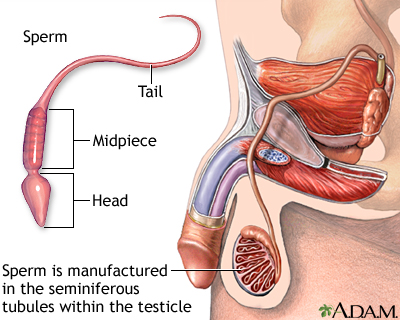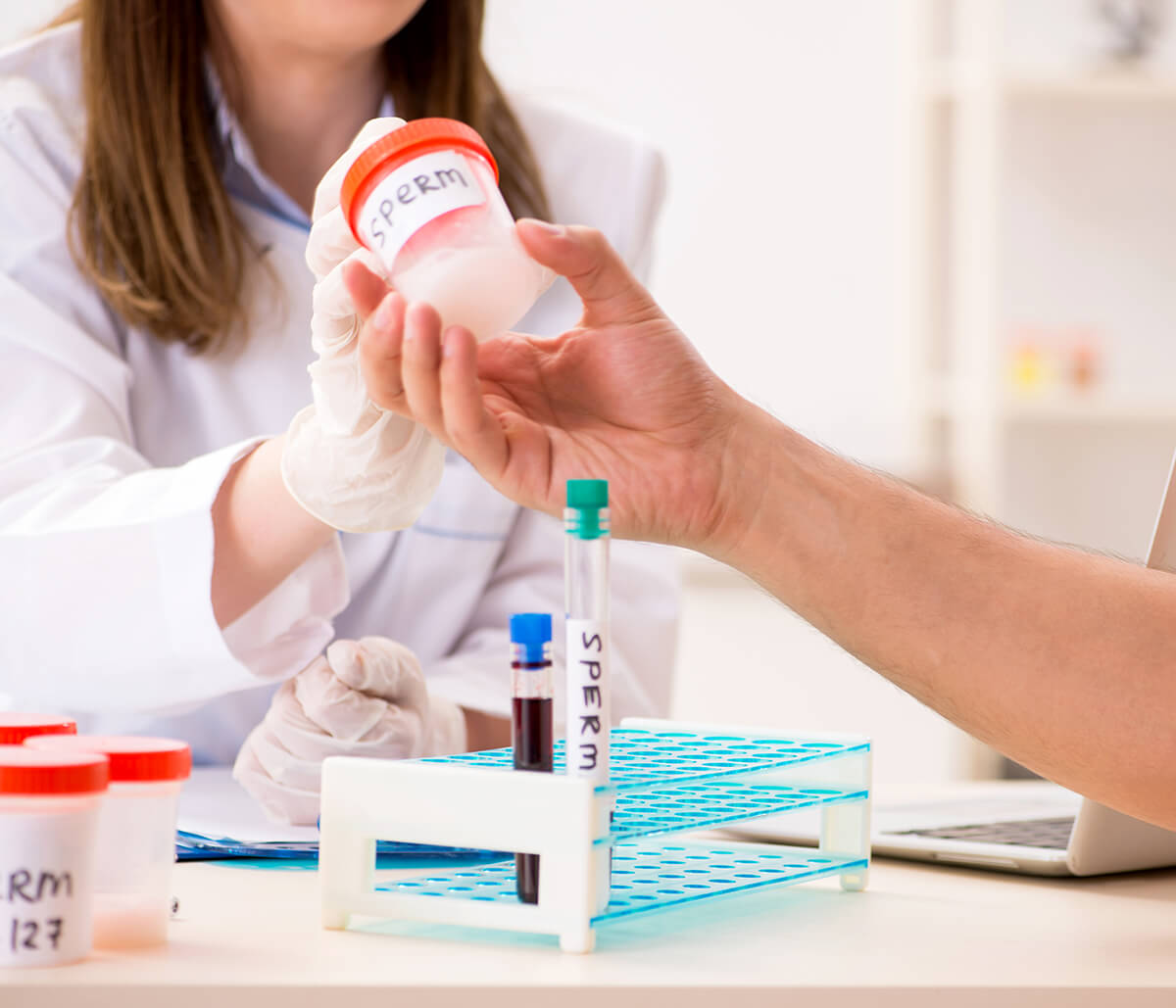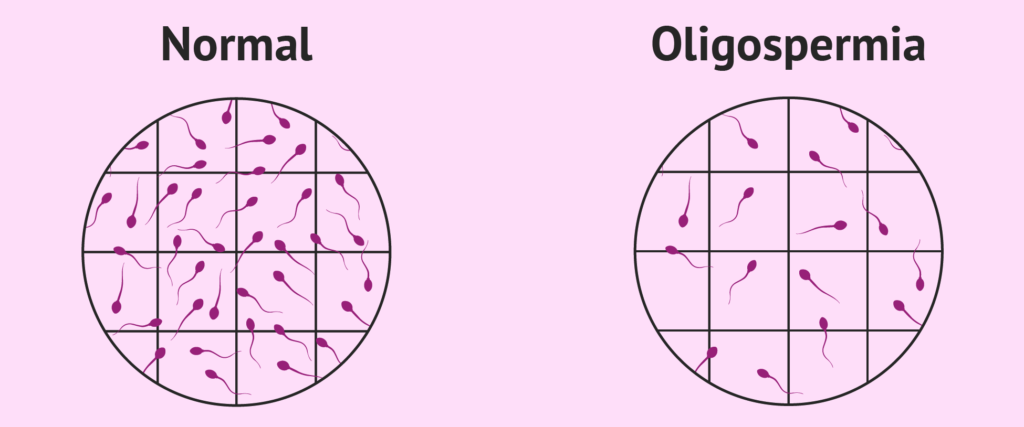Sperm count plays a significant role in the fertility of a man. It is, therefore, of high importance to have adequate knowledge about your sperm count and its effect on your fertility.
Approximately, 40% – 50% infertility cases are related to “male factor” infertility. About up to 2% of all males have inadequate sperm parameters such as sperm production or delivery problem.
In this article, I will be sharing with you all you need to know about sperm count and its effect on your fertility.
Before we dive in further:
What is Sperm?
Sperm is the male reproductive cell. These cells are approximately 0.05 milliliters long (or about 2 thousandths of an inch). They’re not visible to the naked eye, but using a microscope, we can see the structure of sperm.
They have a few distinct parts; the head, which contains the nucleus, which carries the genetic material; a midpiece; and a tail, which propels it for swimming and helps breach the egg.
On average, a male produces approximately 73 million sperm cells per milliliter of ejaculate. These sperm cells swim to and fertilize a female reproductive cell called an oocyte, or egg, which results in a human embryo.
How do Sperm Cells Develop?

Sperm production occurs in the male sex organ, the testicles. These testicles are slightly outside of the body in the scrotum because sperm are sensitive to heat. A man’s internal body temperature is too high for sperm cells to survive.
The sperm cells develop inside a system of tiny tubes known as the seminiferous tubules in the testicles. They begin as tiny round cells. These cells divide and change until they resemble tadpoles with a head and short tail after being exposed to reproductive hormones.
However, these hormones such as testosterone, FSH (follicle-stimulating hormone), and LH (luteinizing hormone) are controlled and produced by the pituitary gland and the testicles.
The process of maturation of a sperm cell to be capable of egg fertilization takes around two and half months. However, upon reaching puberty, a man will produce millions of sperm cells every day.
What is Sperm Count?

Sperm count refers to the average number of sperm present in one sample of semen, that is, an indication of a man’s fertility.
Normal sperm count ranges from 15 million to greater than 200 million sperm per milliliter of semen.
Based on the most recent World Health Organization (WHO) guidelines, experts consider a healthful sperm count to be 15 million per milliliter (ml), or at least 39 million per ejaculate.
How to Know your Sperm Count

You can determine your sperm count through a semen analysis. A semen analysis, also called seminogram or spermiogram, evaluates certain characteristics of a male’s semen and the sperm contained therein. It therefore, evaluates male fertility.
It is, however, by examining semen under a microscope to see how many sperm appear within squares on a grid pattern.
You can likewise, have the test done in your doctor’s office, at a fertility clinic, or using a home-test.
Effect of Sperm count on Fertility

A healthy Sperm count has an impact on fertility because a reduced sperm count lowers your chances of getting your partner pregnant. Twenty million sperm per milliliter may be adequate for pregnancy if the sperm are healthy.
Male infertility factor, often due to a low sperm count, is a common reason many couples have trouble conceiving. Having more healthy sperm increases your chances of becoming pregnant every month.
Sperm Count Abnormalities
This may indicate an underlying health condition. Therefore, anything less than 15 million sperm per milliliter, or 39 million sperm per ejaculate, is considered low.
Sperm count abnormalities can occur in two ways:
Azoospermia (No Sperm Count)
Azoospermia is the absence of sperm in your ejaculate. In other words, it is referred to as “no sperm count.
About five percent (5%) of infertile men have azoospermia, or an absence of sperm in the ejaculate.
Azoospermia is associated with the following problems:
- Inability to Produce Sperm: The three major causes are hormonal problems, testicular failure, and varicocele.
- Sperm Delivery Problems: These are generally caused either by a problem with the ductal system that carries the sperm, or problems with ejaculation. The sperm-carrying ducts may be missing or blocked.
Diagnosis of Azoospermia
To diagnose for Azoospermia, consult your doctor.
Your doctor will ask you to ejaculate into a cup and submit the specimen to a lab for semen analysis. If no living sperm is in the ejaculate/semen, you may have azoospermia..
Along with a physical exam, your doctor will also be interested in your medical history and carry out other related tests.
Treatment of Azoospermia
Treatment depends on causes of infertility and it does not always need a surgery. However, some lifestyle choices and natural remedies may aid the healthy development of sperm and improve sperm count.
Lifestyle Choices
- Get enough exercise and sleep
- Quit smoking
- Reduce alcohol
- Avoid excessive drug use
- Maintain a healthy weight
Natural Remedies
Practitioners of ancient, herbal, and traditional medicine have used several nonpharmacologic remedies to increase sperm count and improve sperm health for thousands of years.
Also, researchers have suggested that most of these remedies can actually influence sperm count in some way.
As a natural health research company, we are sure that Azoospermia Remedy Kit ( can be of help to you. At Plan B Wellness, we have unparalleled knowledge of herbs for healing and our results are the confirmation we have to show for it.
Start your journey to cure azoospermia today by contacting us.
Oligospermia (Low Sperm Count)

Oligospermia means that the fluid (semen) you ejaculate during an orgasm contains fewer sperm than normal. That is, less than 15 million per milliliter or 39 million sperm per ejaculate.
Doctors consider a sperm count under 15 million per ml to be low, and it may cause fertility issues.
Having a low sperm count decreases the odds that one of your sperm will fertilize your partner’s egg to result in pregnancy.
Causes of Oligospermia
- Medical causes : Oligospermia can be caused by a number of health issues and medical treatments such as Varicocele, Infections, Tumors, Ejaculation, Antibodies that attack sperm and so on.
- Environmental causes : Sperm production or function can be affected by overexposure to certain environmental elements, including Industrial chemicals, Radiation or X-rays, Heavy metals, and, Overheating the testicles
- Health and lifestyle causes : Such as Occupation, Drug use, Alcohol intake, Emotional stress, Smoking and so on.
Diagnosis of Oligospermia
Medical history and a general physical examination
Examining your genitals and asking questions any medical history that may affect your fertility . Your doctor may also inquire about your sexual habits and development.
Semen analysis
A low sperm count is diagnosed as part of a semen analysis test.
Semen is collected by ejaculation into a collection cup in a private room at your doctor’s office. Sometimes you can collect your sample at home. If so, you’ll have to keep it at room temperature and get it to your doctor or lab within 1 hour. Some doctors provide you with a special condom that collects your semen during sex.
Treatment of Oligospermia
A number of factors can lower sperm count, from smoking and drinking alcohol to certain medications or long-term illness.
However, there are different steps men can take to increase sperm count such as;
Avoiding harmful activities and agents
- Abstain from drugs and smoking
- Limit or abstain from alcohol
- Maintain a healthy weight
- Limit exposure to high-stress environments
- Avoid pesticides, heavy metals and other toxins
- Avoid heat (Jacuzzis, saunas, hot tubs)
Medication
Particularly, natural remedies have been proven to aid the healthy development of sperm and improve sperm count.
As a natural health research company, we are sure that Oligospermia Remedy Kit (for low sperm count) can be a solution to treat oligospermia.
The Remedy Kit comprises of 100% natural, safe, and powerful sperm-generating therapy with no negative side effects. No danger on your fertility system or body system in general.
Start your journey to cure Oligospermia today by contacting us.
Conclusion
Sperm count is an important factor for fertility. However, abnormalities such as Azoospermia and Oligospermia can affect your fertility.
Also, most research supports the use of lifestyle changes, natural remedies, and dietary adjustments to help a male manage and improve a low sperm count.
Such lifestyle changes include adopting a regular exercise routine and sleep schedule, as well as avoiding tobacco, excess alcohol, and illicit drugs.
I hope you found this information helpful!
Stay healthy and never give up!
Plan B Wellness Limited
WhatsApp: +2348099666658, +2348099666648
Call: +2348099666650
Email: consult@maleinfertilityremedy.com
Instagram: @maleinfertilityremedy
Facebook Page: All About Male Infertility








[…] is a common cause of male infertility. It often produces no symptoms. However, it can cause low sperm production and decreased sperm quality, leading to […]
[…] are three major male fertility hormones.These three male fertility hormones are essential for sperm production. They are counter-balanced; an imbalance in one might cause an imbalance in the […]